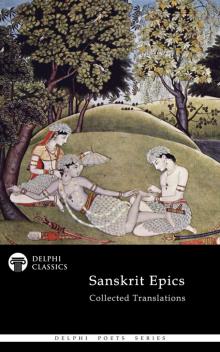- Home
- Delphi Classics
Masters of the Theatre Page 3
Masters of the Theatre Read online
Page 3
And ne’er can stand enrolled as Creon’s man.
Thus then I answer: since thou hast not spared
To twit me with my blindness — thou hast eyes,
Yet see’st not in what misery thou art fallen,
Nor where thou dwellest nor with whom for mate.
Dost know thy lineage? Nay, thou know’st it not,
And all unwitting art a double foe
To thine own kin, the living and the dead;
Aye and the dogging curse of mother and sire
One day shall drive thee, like a two-edged sword,
Beyond our borders, and the eyes that now
See clear shall henceforward endless night.
Ah whither shall thy bitter cry not reach,
What crag in all Cithaeron but shall then
Reverberate thy wail, when thou hast found
With what a hymeneal thou wast borne
Home, but to no fair haven, on the gale!
Aye, and a flood of ills thou guessest not
Shall set thyself and children in one line.
Flout then both Creon and my words, for none
Of mortals shall be striken worse than thou.
OEDIPUS
Must I endure this fellow’s insolence?
A murrain on thee! Get thee hence! Begone
Avaunt! and never cross my threshold more.
TEIRESIAS
I ne’er had come hadst thou not bidden me.
OEDIPUS
I know not thou wouldst utter folly, else
Long hadst thou waited to be summoned here.
TEIRESIAS
Such am I — as it seems to thee a fool,
But to the parents who begat thee, wise.
OEDIPUS
What sayest thou— “parents”? Who begat me, speak?
TEIRESIAS
This day shall be thy birth-day, and thy grave.
OEDIPUS
Thou lov’st to speak in riddles and dark words.
TEIRESIAS
In reading riddles who so skilled as thou?
OEDIPUS
Twit me with that wherein my greatness lies.
TEIRESIAS
And yet this very greatness proved thy bane.
OEDIPUS
No matter if I saved the commonwealth.
TEIRESIAS
’Tis time I left thee. Come, boy, take me home.
OEDIPUS
Aye, take him quickly, for his presence irks
And lets me; gone, thou canst not plague me more.
TEIRESIAS
I go, but first will tell thee why I came.
Thy frown I dread not, for thou canst not harm me.
Hear then: this man whom thou hast sought to arrest
With threats and warrants this long while, the wretch
Who murdered Laius — that man is here.
He passes for an alien in the land
But soon shall prove a Theban, native born.
And yet his fortune brings him little joy;
For blind of seeing, clad in beggar’s weeds,
For purple robes, and leaning on his staff,
To a strange land he soon shall grope his way.
And of the children, inmates of his home,
He shall be proved the brother and the sire,
Of her who bare him son and husband both,
Co-partner, and assassin of his sire.
Go in and ponder this, and if thou find
That I have missed the mark, henceforth declare
I have no wit nor skill in prophecy.
[Exeunt TEIRESIAS and OEDIPUS]
CHORUS
(Str. 1)
Who is he by voice immortal named from Pythia’s rocky cell,
Doer of foul deeds of bloodshed, horrors that no tongue can tell?
A foot for flight he needs
Fleeter than storm-swift steeds,
For on his heels doth follow,
Armed with the lightnings of his Sire, Apollo.
Like sleuth-hounds too
The Fates pursue.
(Ant. 1)
Yea, but now flashed forth the summons from Parnassus’ snowy peak,
“Near and far the undiscovered doer of this murder seek!”
Now like a sullen bull he roves
Through forest brakes and upland groves,
And vainly seeks to fly
The doom that ever nigh
Flits o’er his head,
Still by the avenging Phoebus sped,
The voice divine,
From Earth’s mid shrine.
(Str. 2)
Sore perplexed am I by the words of the master seer.
Are they true, are they false? I know not and bridle my tongue for
fear,
Fluttered with vague surmise; nor present nor future is clear.
Quarrel of ancient date or in days still near know I none
Twixt the Labdacidan house and our ruler, Polybus’ son.
Proof is there none: how then can I challenge our King’s good name,
How in a blood-feud join for an untracked deed of shame?
(Ant. 2)
All wise are Zeus and Apollo, and nothing is hid from their ken;
They are gods; and in wits a man may surpass his fellow men;
But that a mortal seer knows more than I know — where
Hath this been proven? Or how without sign assured, can I blame
Him who saved our State when the winged songstress came,
Tested and tried in the light of us all, like gold assayed?
How can I now assent when a crime is on Oedipus laid?
CREON
Friends, countrymen, I learn King Oedipus
Hath laid against me a most grievous charge,
And come to you protesting. If he deems
That I have harmed or injured him in aught
By word or deed in this our present trouble,
I care not to prolong the span of life,
Thus ill-reputed; for the calumny
Hits not a single blot, but blasts my name,
If by the general voice I am denounced
False to the State and false by you my friends.
CHORUS
This taunt, it well may be, was blurted out
In petulance, not spoken advisedly.
CREON
Did any dare pretend that it was I
Prompted the seer to utter a forged charge?
CHORUS
Such things were said; with what intent I know not.
CREON
Were not his wits and vision all astray
When upon me he fixed this monstrous charge?
CHORUS
I know not; to my sovereign’s acts I am blind.
But lo, he comes to answer for himself.
[Enter OEDIPUS.]
OEDIPUS
Sirrah, what mak’st thou here? Dost thou presume
To approach my doors, thou brazen-faced rogue,
My murderer and the filcher of my crown?
Come, answer this, didst thou detect in me
Some touch of cowardice or witlessness,
That made thee undertake this enterprise?
I seemed forsooth too simple to perceive
The serpent stealing on me in the dark,
Or else too weak to scotch it when I saw.
This thou art witless seeking to possess
Without a following or friends the crown,
A prize that followers and wealth must win.
CREON
Attend me. Thou hast spoken, ’tis my turn
To make reply. Then having heard me, judge.
OEDIPUS
Thou art glib of tongue, but I am slow to learn
Of thee; I know too well thy venomous hate.
CREON
First I would argue out this very point.
OEDIPUS
O argue not that thou art not a rogue.
CREON
If thou dost
count a virtue stubbornness,
Unschooled by reason, thou art much astray.
OEDIPUS
If thou dost hold a kinsman may be wronged,
And no pains follow, thou art much to seek.
CREON
Therein thou judgest rightly, but this wrong
That thou allegest — tell me what it is.
OEDIPUS
Didst thou or didst thou not advise that I
Should call the priest?
CREON
Yes, and I stand to it.
OEDIPUS
Tell me how long is it since Laius...
CREON
Since Laius...? I follow not thy drift.
OEDIPUS
By violent hands was spirited away.
CREON
In the dim past, a many years agone.
OEDIPUS
Did the same prophet then pursue his craft?
CREON
Yes, skilled as now and in no less repute.
OEDIPUS
Did he at that time ever glance at me?
CREON
Not to my knowledge, not when I was by.
OEDIPUS
But was no search and inquisition made?
CREON
Surely full quest was made, but nothing learnt.
OEDIPUS
Why failed the seer to tell his story then?
CREON
I know not, and not knowing hold my tongue.
OEDIPUS
This much thou knowest and canst surely tell.
CREON
What’s mean’st thou? All I know I will declare.
OEDIPUS
But for thy prompting never had the seer
Ascribed to me the death of Laius.
CREON
If so he thou knowest best; but I
Would put thee to the question in my turn.
OEDIPUS
Question and prove me murderer if thou canst.
CREON
Then let me ask thee, didst thou wed my sister?
OEDIPUS
A fact so plain I cannot well deny.
CREON
And as thy consort queen she shares the throne?
OEDIPUS
I grant her freely all her heart desires.
CREON
And with you twain I share the triple rule?
OEDIPUS
Yea, and it is that proves thee a false friend.
CREON
Not so, if thou wouldst reason with thyself,
As I with myself. First, I bid thee think,
Would any mortal choose a troubled reign
Of terrors rather than secure repose,
If the same power were given him? As for me,
I have no natural craving for the name
Of king, preferring to do kingly deeds,
And so thinks every sober-minded man.
Now all my needs are satisfied through thee,
And I have naught to fear; but were I king,
My acts would oft run counter to my will.
How could a title then have charms for me
Above the sweets of boundless influence?
I am not so infatuate as to grasp
The shadow when I hold the substance fast.
Now all men cry me Godspeed! wish me well,
And every suitor seeks to gain my ear,
If he would hope to win a grace from thee.
Why should I leave the better, choose the worse?
That were sheer madness, and I am not mad.
No such ambition ever tempted me,
Nor would I have a share in such intrigue.
And if thou doubt me, first to Delphi go,
There ascertain if my report was true
Of the god’s answer; next investigate
If with the seer I plotted or conspired,
And if it prove so, sentence me to death,
Not by thy voice alone, but mine and thine.
But O condemn me not, without appeal,
On bare suspicion. ’Tis not right to adjudge
Bad men at random good, or good men bad.
I would as lief a man should cast away
The thing he counts most precious, his own life,
As spurn a true friend. Thou wilt learn in time
The truth, for time alone reveals the just;
A villain is detected in a day.
CHORUS
To one who walketh warily his words
Commend themselves; swift counsels are not sure.
OEDIPUS
When with swift strides the stealthy plotter stalks
I must be quick too with my counterplot.
To wait his onset passively, for him
Is sure success, for me assured defeat.
CREON
What then’s thy will? To banish me the land?
OEDIPUS
I would not have thee banished, no, but dead,
That men may mark the wages envy reaps.
CREON
I see thou wilt not yield, nor credit me.
OEDIPUS
[None but a fool would credit such as thou.] 3
CREON
Thou art not wise.
OEDIPUS
Wise for myself at least.
CREON
Why not for me too?
OEDIPUS
Why for such a knave?
CREON
Suppose thou lackest sense.
OEDIPUS
Yet kings must rule.
CREON
Not if they rule ill.
OEDIPUS
Oh my Thebans, hear him!
CREON
Thy Thebans? am not I a Theban too?
CHORUS
Cease, princes; lo there comes, and none too soon,
Jocasta from the palace. Who so fit
As peacemaker to reconcile your feud?
[Enter JOCASTA.]
JOCASTA
Misguided princes, why have ye upraised
This wordy wrangle? Are ye not ashamed,
While the whole land lies striken, thus to voice
Your private injuries? Go in, my lord;
Go home, my brother, and forebear to make
A public scandal of a petty grief.
CREON
My royal sister, Oedipus, thy lord,
Hath bid me choose (O dread alternative!)
An outlaw’s exile or a felon’s death.
OEDIPUS
Yes, lady; I have caught him practicing
Against my royal person his vile arts.
CREON
May I ne’er speed but die accursed, if I
In any way am guilty of this charge.
JOCASTA
Believe him, I adjure thee, Oedipus,
First for his solemn oath’s sake, then for mine,
And for thine elders’ sake who wait on thee.
CHORUS
(Str. 1)
Hearken, King, reflect, we pray thee, but not stubborn but relent.
OEDIPUS
Say to what should I consent?
CHORUS
Respect a man whose probity and troth
Are known to all and now confirmed by oath.
OEDIPUS
Dost know what grace thou cravest?
CHORUS
Yea, I know.
OEDIPUS
Declare it then and make thy meaning plain.
CHORUS
Brand not a friend whom babbling tongues assail;
Let not suspicion ‘gainst his oath prevail.
OEDIPUS
Bethink you that in seeking this ye seek
In very sooth my death or banishment?
CHORUS
No, by the leader of the host divine!
(Str. 2)
Witness, thou Sun, such thought was never mine,
Unblest, unfriended may I perish,
If ever I such wish did cherish!
But O my heart is desolate
Musing on our strike
n State,
Doubly fall’n should discord grow
Twixt you twain, to crown our woe.
OEDIPUS
Well, let him go, no matter what it cost me,
Or certain death or shameful banishment,
For your sake I relent, not his; and him,
Where’er he be, my heart shall still abhor.
CREON
Thou art as sullen in thy yielding mood
As in thine anger thou wast truculent.
Such tempers justly plague themselves the most.
OEDIPUS
Leave me in peace and get thee gone.
CREON
I go,
By thee misjudged, but justified by these.
[Exeunt CREON]
CHORUS
(Ant. 1)
Lady, lead indoors thy consort; wherefore longer here delay?
JOCASTA
Tell me first how rose the fray.
CHORUS
Rumors bred unjust suspicious and injustice rankles sore.
JOCASTA
Were both at fault?
CHORUS
Both.
JOCASTA
What was the tale?
CHORUS
Ask me no more. The land is sore distressed;
‘Twere better sleeping ills to leave at rest.
OEDIPUS
Strange counsel, friend! I know thou mean’st me well,
And yet would’st mitigate and blunt my zeal.
CHORUS
(Ant. 2)
King, I say it once again,
Witless were I proved, insane,
If I lightly put away
Thee my country’s prop and stay,
Pilot who, in danger sought,
To a quiet haven brought
Our distracted State; and now
Who can guide us right but thou?
JOCASTA
Let me too, I adjure thee, know, O king,
What cause has stirred this unrelenting wrath.
OEDIPUS
I will, for thou art more to me than these.
Lady, the cause is Creon and his plots.
JOCASTA
But what provoked the quarrel? make this clear.
OEDIPUS
He points me out as Laius’ murderer.
JOCASTA
Of his own knowledge or upon report?
OEDIPUS
He is too cunning to commit himself,
And makes a mouthpiece of a knavish seer.
JOCASTA
Then thou mayest ease thy conscience on that score.
Listen and I’ll convince thee that no man
Hath scot or lot in the prophetic art.
Here is the proof in brief. An oracle
Once came to Laius (I will not say
’Twas from the Delphic god himself, but from
His ministers) declaring he was doomed
To perish by the hand of his own son,
A child that should be born to him by me.
Now Laius — so at least report affirmed —
Was murdered on a day by highwaymen,
No natives, at a spot where three roads meet.
As for the child, it was but three days old,
When Laius, its ankles pierced and pinned

 Masters of the Theatre
Masters of the Theatre Masters of the Novella
Masters of the Novella The Sanskrit Epics
The Sanskrit Epics